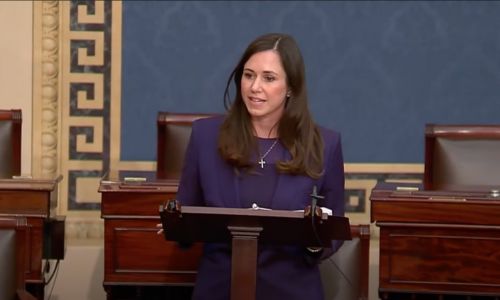Washington D.C. – U.S. Senator Katie Britt (R-Ala.) recently addressed the Senate floor, drawing attention to the growing mental health crisis among the nation’s youth, which she directly linked to the rise of social media. In her remarks, Senator Britt cited statistics that reflect the detrimental effects social media platforms have had on adolescents’ mental health.
“Emergency room visits amongst adolescents for anxiety, mood disorders, and self-harm have all risen dramatically in the years since social media apps exploded onto the scene,” Senator Britt stated, referencing data that highlights a stark increase in mental health struggles among young people. She noted that, since the early 2000s, rates of depression among teenagers have more than doubled, with 20% of teens agreeing with the statement “life often feels meaningless” by 2019. The Centers for Disease Control and Prevention (CDC) reported that, in 2021, one in three high school girls seriously considered suicide, with 25% having made a plan and 9% of high schoolers, and 13% of teenage girls, attempting suicide.
Senator Britt also pointed out the need for Congressional action in regulating social media, emphasizing that the last major legislation passed addressing children’s interactions with the internet was the Children’s Online Privacy Protection Act in 1998. “For reference, at that time, MySpace didn’t even exist. It’s time for an update,” she remarked, advocating for comprehensive reform to address the evolving challenges posed by social media.
During a recent Senate Judiciary Committee hearing, Senator Britt heard emotional testimonies from parents who lost children to fentanyl poisoning linked to social media platforms, particularly Snapchat. “Not one, but two parents told their painful stories, where their children had died of fentanyl poisoning from a pill they bought on Snapchat,” she said, highlighting the broader risks social media poses to young people beyond mental health concerns.
In response to the crisis, Senator Britt, alongside Senators Ted Cruz (R-Texas), Chris Murphy (D-Conn.), and Brian Schatz (D-Hawaii), reintroduced the bipartisan Kids Off Social Media Act. The legislation, which recently passed out of the Senate Commerce Committee, aims to limit the harmful impact of social media on minors. Specifically, the bill seeks to prevent platforms from targeting algorithm-driven content to users under the age of 17. Senator Britt pointed to a report from former U.S. Surgeon General Vivek Murthy, which found that nearly half of adolescents report that social media makes them feel worse about their bodies, underscoring the need for such legislative measures.
Further reinforcing the bill’s support, Senator Britt cited a survey by the Count on Mothers group, revealing that over 90% of mothers believe there should be a minimum age of 13 for social media use, and 87% agree that personalized algorithms should not be allowed to deliver content to children. “There is nothing more important we can do as a body than protect the people we serve,” she concluded, urging her colleagues to act swiftly to pass the bill. “Parents across this country are counting on us to step up, put the proper guardrails in place, so their children can be safe, explore, and succeed.”
The Kids Off Social Media Act now heads to the full Senate for further consideration. If passed, the legislation could mark a significant step toward addressing the mental health crisis exacerbated by social media and ensuring greater safety for younger generations.












